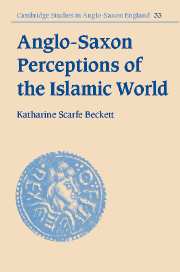Book contents
- Frontmatter
- Contents
- Acknowledgements
- List of abbreviations
- 1 Introduction
- 2 Islam during the Anglo-Saxon period
- 3 Anglo-Saxon contacts with Islam
- 4 Arabs and Arabia in Latin
- 5 Ismaelites and Saracens in Latin
- 6 Arabs, Ismaelites and Saracens in early Anglo-Latin
- 7 Pseudo-Methodius and the sons of Ismael
- 8 Arabs, Ismaelites and Saracens in Old English
- 9 Persisting theories about Saracens in post-Conquest England
- 10 Conclusions
- Bibliography
- Index
9 - Persisting theories about Saracens in post-Conquest England
Published online by Cambridge University Press: 22 September 2009
- Frontmatter
- Contents
- Acknowledgements
- List of abbreviations
- 1 Introduction
- 2 Islam during the Anglo-Saxon period
- 3 Anglo-Saxon contacts with Islam
- 4 Arabs and Arabia in Latin
- 5 Ismaelites and Saracens in Latin
- 6 Arabs, Ismaelites and Saracens in early Anglo-Latin
- 7 Pseudo-Methodius and the sons of Ismael
- 8 Arabs, Ismaelites and Saracens in Old English
- 9 Persisting theories about Saracens in post-Conquest England
- 10 Conclusions
- Bibliography
- Index
Summary
Hast thou not, close at hand, the Ishmaelite
To cut thee work out, more then thou canst do?
Camões, The Lusiads, trans. Sir R. Fanshawe, 11. 792–3Soon after the Norman Conquest, a group of the more important English ecclesiastical institutions began what appears to have been an organised programme of copying patristic Latin texts from continental exemplars. During the next few decades (the first half of the twelfth century) this programme of copying seems to have spread outwards into smaller centres so that they, too, developed libraries of desirable texts which remained attached to the institution rather than to an individual (as book-collections had tended to do in Anglo-Saxon England). The second quarter of the twelfth century saw a dramatic increase in the number of texts being imported and copied throughout England. Desirable texts were, primarily, exegesis and classical writings. The four church fathers are well represented from this period, along with many secular Latin works and some in Greek. Scientific texts were also copied, as were contemporary biblical commentaries by continental authors. It is safe to say that antiquated information about the Saracens continued to be newly circulated even as Christian European writers and readers got to grips with new texts about them – eye-witness accounts of the Crusades, pilgrims' tales and the like – and also new texts from them – scientific literature and translations of religious works, including the Qur'ān.
- Type
- Chapter
- Information
- Anglo-Saxon Perceptions of the Islamic World , pp. 190 - 222Publisher: Cambridge University PressPrint publication year: 2003



